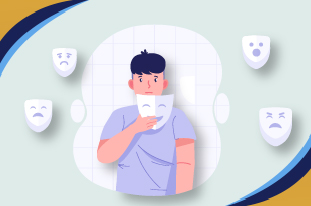Emetophobia is the fear of vomiting. People who struggle with this phobia often face social and workplace isolation and take many precautions to make sure they don’t vomit, just like someone who fears elevators and goes up stairs 10 times a day. Kids who suffer from emetophobia refuse to go to school or visit a friend’s house, and adults miss work and avoid eating at restaurants. Because of the fear of vomiting, a lot of life is avoided. To avoid something disagreeable that rarely occurs entails missing out on a lot of life and a considerable deal of thinking and strategic planning. What is so distressing is the uncertainty of not knowing when it will occur. This article explores emetophobia’s meaning, how to get over it, and the symptoms of emetophobia.
What is Emetophobia?
Emetophobia is a specific phobia involving a severe fear of vomiting, seeing vomit, watching other people vomit, or feeling sick. People who suffer from emetophobia are always anxious and behave in a way that affects their daily lives.
In the Diagnostic and Statistical Manual of Mental Disorders, emetophobia falls under the umbrella of specific phobias. Specific phobias are the reason for anxiety and panic attacks caused by the actions that trigger your fear.
Like many other phobias, the fear of vomiting starts small and develops the roots of fear until it becomes something that causes panic and anxiety. This type of phobia may develop after a traumatic experience involving vomiting or for no reason at all. In children with emetophobia, many of them have anxiety issues before developing this specific fear.
Read More: Can Anxiety Cause Chest Pain and Shortness of Breath?
Symptoms and Causes of Emetophobia
To discuss emetophobia symptoms and emetophobia triggers, we need to know what causes this fear to happen. Motion sickness, a stomach bug, food poisoning, excessive eating or drinking, food intolerance, and anxiety cause nausea and stomach discomfort.
This can cause the following symptoms of emetophobia: increased heart rate, sweating, shaking, an upset stomach, a tight feeling in your chest, lightheadedness, dizziness, or fainting.

You may take certain actions to deal with your fear if you have emetophobia. If you prepare for any event that can involve vomiting, you may feel more at peace because you may not feel in control of your body when you vomit. Identifying a bathroom near it, having a trash can next to your bed while you sleep, avoiding long vehicle rides, and roller coaster rides, being close to the ocean, and avoiding drugs that have nausea or vomiting listed as a potential adverse effect are examples of these behaviors.
What are Emetophobia Triggers?
Emetophobia triggers involve watching someone who is vomiting, feeling nauseous, hearing or saying words related to vomiting, going into a new place and smelling vomit there, and being around foods that previously caused vomiting.
Read More: Behavioral Health VS Mental Health: What is the Difference?
How Emetophobia Affects Those Who Have It?
Emetophobia is the fear of or anxiety over vomiting. People with this fear get put off by the act of being ill, but many believe that the anticipation leading up to vomiting is worse than actually vomiting. Emetophobia can affect everyone, however, it is more prevalent in women than in men.
In addition to their fear of vomiting, emetophobics may also be terrified of being unable to locate a bathroom, frequent or uncontrollable vomiting, choking on their vomit, feeling ashamed in front of others due to vomiting, and visiting a medical facility.
Read More: Let’s Talk About The Relationship Between ADHD and Anxiety
How to Get Rid of Emetophobia?
Searching for answers to questions like how to overcome emetophobia? How do you get rid of emetophobia? How can someone help someone with emetophobia? Or how to calm down an emetophobia panic attack? Let’s see how we can get rid of emetophobia.
There are different ways to treat emetophobia, which include psychiatric medication management, psychotherapy, and lifestyle modifications.
Medication Management
Medications aren’t usually used to treat emetophobia. But sometimes, medications can temporarily help relieve symptoms of fear and anxiety to treat your phobia when you’re going through psychological therapy or in unavoidable situations. Medicines like antidepressants are used that are used to treat anxiety and depression.
Read More: The Association of Panic Disorder with Agoraphobia
Psychotherapy
Talk therapy or psychotherapy is used to treat emetophobia. If we go specific, then cognitive behavioral therapy(CBT) and exposure therapy are used. CBT is used to treat many other conditions as well, including adjustment disorder, ADHD, and psychosis or schizophrenia. In this therapy, fears are treated by managing the negative thought patterns of the brain. Another therapy is exposure therapy which is usually used to manage OCD, acute stress, specific phobias, and post-traumatic stress disorder (PTSD). In this therapy, the sufferer is slowly exposed to its fear to manage it.
Lifestyle Modifications
Another way to manage emetophobia is by making changes to your lifestyle. Deep breathing, meditation, mindfulness, and yoga can help you control your emotions and fears, and this way manage your phobia.
Read More: Can Anxiety Cause Dizziness? A Complete Understanding Of The Link
Emetophobia Treatment at Orange Coast Psychiatry
If you want treatment for emetophobia, there is no better place than Orange Coast Psychiatry. We have telehealth services for all mental health disorders. Whether you need treatment for adjustment disorder or social anxiety disorder(SAD), we have you covered. Our expert psychiatrists offer customized and evidence-based solutions for psychosis and ADHD. Get in touch with us now and receive telepsychiatric services from anywhere.
Conclusion
Fear of vomiting is a kind of phobia caused by watching someone vomit, being unable to find bathrooms in new places, and being around food that causes you to vomit. However, there are methods to manage this phobia including cognitive behavioral therapy and exposure therapy. If you still need help, Orange Coast Psychiatry is one call away.
























